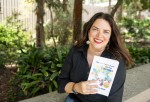Poems will mix multiple languages in “The Latin Poet’s Guide to the Cosmos.”
Susannah Rodríguez Drissi, a UCLA lecturer in Writing Programs, published her book in May. The book is a collection of 26 poems written in a combination of Romance languages including Spanish, Italian, French, English, Portuguese, and the Berber language, but most clearly resembling Spanish and Italian.
Each poem is written in a combination of many languages rather than one specific language. The book prompts readers, through exposure to a number of languages at once, to engage in interactions with the languages that allow them to better understand the poetry, Rodríguez Drissi said.
“The poems are written in a language that is at once many languages (but also) none at all,” Rodríguez Drissi said. “They speak to an exilic mode of being, which forces the speaker to reinvent themself.”
[RELATED: Professor creates organization encouraging students of all majors to explore poetry]
Rodríguez Drissi said writing the poems was not a difficult experience, but rather a natural process of language saturation, or exposure to a number of languages at once. Written predominantly in 1998, Rodríguez Drissi said she used her knowledge of various languages to synthesize the idea of Romance languages into the poems.
While writing, she said she wanted to highlight how sound provokes emotion and the relationship between sound and emotion. For example, Rodríguez Drissi said she was interested in the “O” sound and began one of her poems with the phrase “loa, loa.” This did not necessarily mean anything, Rodríguez Drissi said, but rather had a similar surprising effect to saying “woah, woah.” It is the sound of the poems, she said, that provides meaning.
Because readers likely won’t be familiar with every language, Rodríguez Drissi said the collection may be disorienting at first. Many words are not immediately familiar and when they are all strung together, it can be hard to separate one word from another, much like learning a new language, she said. But the book is meant to be read more than once, and over time a reader may start to gain meaning from familiar sounds and words, such as the Latin roots found in many Romance words, she said.
Norma Mendoza-Dayton, a UCLA professor of anthropology, said the book conveys the sense that everyone engages in a similar approach to language. She said it prompts the reader to think about how others would read the work, and how everyone processes language in similar ways.
One way to approach this intersection of languages is to read the collection more than once, Rodríguez Drissi said. Reading the book is like performing mental exercises to learn about languages in new ways, said Magdalena Edwards, a writer and translator who has worked with Rodríguez Drissi.
The book includes a character which acts as the author, Luciao di Salti Banqui. This character is an acrobat who guides the reader through the poems, and like acrobatic training, the reader is invited to learn about and exercise their language, Edwards said.
[RELATED: Reading of Whitman poem to honor his bicentennial before UCLA centennial kickoff]
Since the poems are meant to be read out loud, the collection asks what performance poetry may mean on the page, Rodríguez Drissi said. When poetry is read, spelling and sentence structure provide information about the poem, Mendoza-Dayton said. But when it is only heard, the listener is not able to stop and analyze it as quickly, which allows them to experience it more in the moment and shifts how they may interact with the language.
“You’re much more floating in the sound of it, floating in the rhythm of it, like you’re in a boat,” Mendoza-Dayton said.
Many sounds that are heard in one language can be identified in others. Rodríguez Drissi said the world is becoming increasingly globalized and there is a lot of exposure to many different languages. Edwards said navigating a book like this allows the reader to exercise their minds to become more comfortable with this type of language interaction.
“It invites us to not be scared or shy about exploring the world in environments where we may not know the language that’s dominant,” Edwards said.
Rodríguez Drissi said the language the poems are written in forces the reader to reinvent themselves and their approach to understanding language by exposing them to an intersection of languages. She said she hopes readers gain a better understanding of language and the ways in which language may contribute to an act of self transformation, such as familiarizing themselves with the unfamiliar.
“You must open your mouth to read the poems out loud, and open your ears to let the music in,” Rodríguez Drissi said.
Email Klena at dklena@dailybruin.com or tweet @KlenaDeirdre.

Just one yr earlier I made a decision to just leave my old work and I am so glad at this time…. I started out earning a living on the internet, for a business I found over the internet, for a few hr on daily basis, and I bring in even more than I did on my office workplace job… My pay-check for past month was $9,000… The best thing on this is the extra spare time I got for my family…and that the single requirement for this task is simple typing and also having access to internet… I am also able to spend quality time with my loved ones and close friends and also look after my children and also going on holiday break with them very consistently. Don’t avoid this opportunity and be sure to take action fast. Test it yourself, what it’s about… skatingaccompany.uploader.eu
LOL.